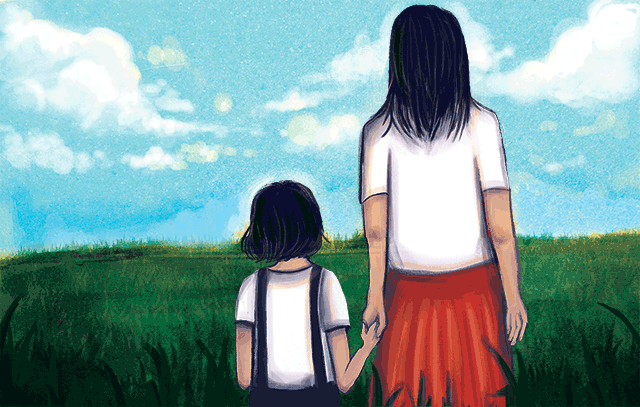Challenges of Freedom
Four North Korean defectors' experiences of resettling to South Korea.
It was the greatest country in the world. Sure, sometimes they saw people die from starvation and heard rumors of people disappearing into prison camps, but it was like that everywhere. At least that’s what they were told. But as foreign media started to spill into the country, they realized it wasn’t like that everywhere; they weren’t living in the greatest country in the world. A better life was out there and they knew they needed to leave to find it.
Every year, many North Koreans risk their lives to escape one of the world’s most oppressive regimes. They trek through jungles and over mountains, terrified of being caught and sent back. Once they finally reach freedom, they start over. New cultures, new opportunities, new challenges.
Here are four of their stories.

Ill Yong
Ill Yong opens Google Maps, trying to find a satellite image of his childhood house. This always makes him homesick. When he zooms in on his house, a blurry gray square surrounded by snow, he remembers the nearby waterfall and the summer days he spent playing there. But he also remembers how hard it was living in North Korea. His family listened to illegal South Korean radio every night but had to keep it hidden from friends and neighbors. If caught, they could have been sent to a political prison camp or even executed.
Ill Yong resettled to South Korea in 2009 and, even though his family was with him, starting over in a new country was challenging. The everyday moments took adjusting to. His first time at a buffet, Ill Yong was so overwhelmed by the massive amount of food that he just took a small bowl of rice. The first time he tried to use an escalator he was so confused about what to do that he jumped on at the bottom and then jumped off at the top. Ill Yong has now been in South Korea for nine years and is studying to become a Human Rights lawyer. A lot has changed since he first arrived (he now knows how to get on an escalator) but he still thinks about his old home in North Korea and hopes to see it again in person one day.

Noel
Noel came to South Korea in 2010 with a shy personality and a strong North Korean accent. She wanted to blend quietly into her new culture, but people constantly asked where she was from. School was also a struggle. In North Korea, she had dropped out after the first grade to stay home and help her mother. What she did learn at school was of little help in her new life. She was used to curriculum that focused on the Kim family. Determined to catch up, she began reading lots of books.
Noel is currently studying to become a writer and is no longer behind in school. Her new challenge is figuring out what to do with her freedom. Living in North Korea, she just followed the regime and did whatever she was told. It was the only option. Now, faced with endless choices, she knows that there is a responsibility that comes with freedom, and she wants to use it wisely.

Jessie
Jessie was overwhelmed. She was by herself in an unfamiliar country. So much was unknown: how to get around, where to study, how to make new friends, and even where to buy groceries. She wasn’t used to this new culture’s rules and norms. The first time she heard someone publicly criticize the South Korean president she was stunned. Freely expressing any negative thoughts about the regime was unheard of in North Korea.
Jessie now understands her new culture and loves her freedoms, especially being able to watch whatever dramas she wants without fear of punishment. South Korea has become her home, but she still longs for the day she can return to North Korea. Her parents have both passed away and she wants to go and pay her respects in person.

Geum Hyok
Geum Hyok stood by himself in an empty apartment wondering if he made a mistake. He had no friends and no family there to reassure him. Feeling lonely but determined to make a life for himself, he started classes at Korea University where he met people who were kind to him and checked on him regularly. Their friendship helped him not feel as lonely. Except for the couple times he was turned down for a job because they didn’t want to hire a North Korean, most people were welcoming to him. But what surprised him most was how many South Koreans didn’t know what was happening in North Korea. Geum Hyok didn’t blame them, he knew humans rights was complicated. But it was still disappointing.
Now, Geum Hyok is studying politics and diplomacy and enjoys having the freedom to do what he wants. He no longer questions his choice to escape but he does think about his loved ones still in North Korea. He especially misses his mother whom he hasn’t seen or spoken to in eight years. He is waiting for the day North Korea finally opens so they can be reunited.
North Korean Refugee Stories: Meet Yoon Suk

Yoon Suk has vivid, happy memories of growing up in North Korea. She was raised during a time when state-socialism was relatively functioning, and the government could provide basic necessities to its citizens. She remembers wearing beautiful nylon (a highly-sought after fabric back in the earlier days of North Korea) uniforms with bows and red, patent-leather shoes to school. She also had a passion for the arts and performed frequently on stage. But as she grew older, the shine in her shoes began to fade and the hunger in her belly began to grow.
After the collapse of the Soviet Union, North Korea lost crucial sources of subsidized trade and aid and the North Korean economy crashed. It was during this time that Yoon Suk got married, but what should have been a happy time in her life ended up being far from it. The regime’s mismanaged agricultural and environmental policies were confounded by harsh weather, plunging the country into a severe famine that lasted for years. Yoon Suk and her husband struggled to survive on the meager rations they received—and they were not alone. During this period, an estimated one million people died from starvation, while many of those who survived suffered immensely.
Yoon Suk, knowing that she had to do something to keep her family alive during the most difficult years of the “Arduous March,” turned to the jangmadang—small, illegal markets where people sold and traded anything they could for food. Yoon Suk was like many North Korean women in this new reality, abandoning her traditional role for market activities. Unfortunately, running her modest merchant business was more challenging than she had anticipated and she struggled to keep it afloat. As the situation grew worse, she discontinued her business and looked for other ways to support her family, which had grown by two with the birth of her sons. It was during this time that she learned that life might be better in booming China.
As recently as three decades ago, Chinese people were on average poorer than their North Korean neighbors. But China’s economic reforms have produced wealth and opportunities that are the envy of nearly all North Koreans today. Since North Korea’s economic collapse, which lead to unprecedented cross-border movement and inflows of Chinese goods and media, North Koreans have gained a painful awareness of just how far their formerly impoverished Chinese neighbors have come.

But it’s extremely risky for North Koreans to escape their country. The North Korean regime makes it illegal to leave without explicit permission and if Yoon Suk was caught trying to escape, or caught in China and sent back, she would be punished severely. Yet, the opportunity was too great to pass up and she fled for the first time in the mid-2000s.
Once she arrived, alone in a foreign country where she didn’t speak the language, Yoon Suk was sold to a Chinese man as his bride. China’s lack of marriageable women, particularly in rural areas of the northeast, creates high demand for female North Korean refugees like Yoon Suk. Without legal status and no protection from the authorities, these women are often kidnapped by sex traffickers and sold, sometimes for as little as $200.

Even though she was now living with a Chinese man, Yoon Suk still wasn’t safe from the watchful eye of the Chinese authorities. North Korean refugees’ well-founded fear of persecution if repatriated means that they should be protected under international refugee law. However, the Chinese government labels them as “economic migrants,” so they can forcibly send them back, as per their agreement with the North Korean regime. Yoon Suk was caught by Chinese police not even a month after arriving and was forcibly repatriated back to North Korea. There, the authorities sent her to a prison camp, where she was abused, beaten, and starved.
After all she had gone through, Yoon Suk was still undeterred from finding freedom outside of North Korea. She escaped again to China shortly after her release from the prison camp. She was sold off three times by traffickers, again under the pretense that she was going to be given work. With the last husband, she had her beautiful daughter.

Yoon Suk wanted to give her daughter a better life, and knew that would not be possible in China. Without the proper documentation, her daughter would have difficulty even going to school and would be denied the opportunities available to other Chinese children. Yoon Suk and her daughter escaped China together through Liberty in North Korea’s network and are now on their way to safety in South Korea.
Yoon Suk is excited for the life and opportunities that lie ahead of her. She’s a talented cook and wants to explore the option of obtaining a culinary certificate in South Korea. She also has high hopes for her daughter, who loves art just like her mother did as a young girl, and wants to enroll her in dance and painting lessons. Yoon Suk’s greatest wish is to reunite with her two adult sons someday. She often dreams about appearing on TV to send a message to her sons, showing them she’s alive and well.
Thank you for helping supply the funds for Yoon Suk’s rescue. Your efforts have changed her life and have provided the opportunity for her to enjoy her new LIBERTY.
Fundraise or donate to help rescue more North Korean refugees today!




